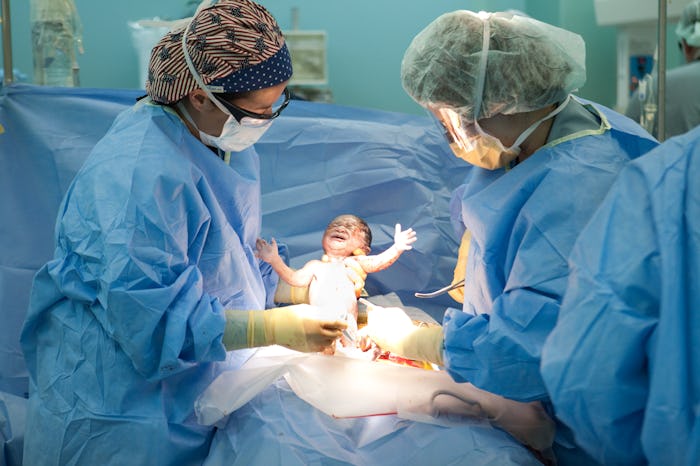Life

7 Things You Really Can't Do While Recovering From A C-Section
Sometimes you know for weeks or even months ahead of time that you're going to have a C-section. C-sections are pretty routine nowadays, so you might be pretty prepared for the birth and for your postoperative routine. However, there are always challenges with every major surgery, and let's be honest, being a new mom is overwhelming and it's easy to neglect yourself in the care of your new baby. But that's asking for trouble. Here are the top seven things you can't do while recovering from a C-section if you want a speedy recovery.
It's easy to fall into the trap of thinking that you'll instinctively know what to do and what not to do after a C-section because you're a person with common sense. And while it's true that most of the restrictions placed on recovery are pretty sensical, there are others which are more subtle and will probably elude you in the haze of new motherhood. (And many aren't explicitly stated because they're obvious.) For instance, no one has to tell you not to train in Olympic curling because you're so taken with it now that the U.S. has won the gold. You and your husband can wait a few more weeks to train for 2022 mixed doubles. But what about the simpler parts of your day like cooking and driving? Those might trip you up. Worry not, I've culled the top seven things you can't do while recovering from a C-section
It's not a rush to the finish line. According to the doctors at All About Women Obstetrics and Gynecology, "It may be a month or more before you are able to resume your previous activity level." That seems like a lot of time, but I will tell you as someone who's had multiple abdominal surgeries, it feels even longer than it sounds. It's down to motoring through.
1Neglect Your Hydration
Recent research points to the need for water early after your C-section and often. A study published in The Journal of American Science found that you should start drinking water soon after the baby's born and remain hydrated. It speeds the healing and helps move your digestion, which can be slowed by the cesarean. Texas HealthCare OB-GYN wrote, "Drink lots of fluids (especially water) to replace the water you lost during delivery, to help with breastfeeding, and to reduce the chance of constipation."
2Lift Anything Heavier Than Your Baby
Fairview Hospital noted in their discharge instructions to not even consider lifting anything heavier than your baby until your provider says it's OK. That includes lifting your baby in their car seat. Those suckers weigh a ton. According to Greenville OB-GYN, "Avoid heavy lifting for six weeks. After those six weeks you may begin an exercise program to regain abdominal muscle tone."
3Use Tampons
You might be tempted, but it's a no-no, noted Beaver Medical Group. I can understand the reasoning behind the desire. I mean, you didn't give birth vaginally, so it should be OK, right? Unfortunately not. You're still healing around your cervix, and tampons put you at a greater risk for infection. Dr. Adriana Zertuche told Romper in an interview that you should use pads only, and avoid douching or hot baths.
4Drive
The rule of thumb is at least two weeks without getting behind the wheel. You have to wait until you're feeling better and you're no longer at risk for dizzy spells, according to the Royal Australian and New Zealand College of Obstetricians and Gynaecologists. It's out of an abundance of safety, noted Linda Katz, MD, an OB-GYN at West Hills Hospital in an interview. She also noted that they tell C-section patients to wait a week or two before they start to drive again.
5Strenuous Activity
Nothing stressful. Don't try to work out or take care of anyone but yourself and your baby, according to Fairview Hospital. It's not worth it. You could screw with the incision, hurt the healing muscles, and just hurt yourself. Be gentle.
6Ignore Signs Of An Infection
According to Beaver Medical Group, a fever of above 100.4 degrees Fahrenheit, bleeding heavier than a period, headaches, painful urination, severe back pain, foul smelling drainage, or heavy vaginal discharge are all warning signs that should not be ignored.
7Ignore Your Pain
If you're in pain, take the meds your doctor has suggested or prescribed. It might be Motrin, it might be codeine, but no matter what, you don't need to be in pain. I know I am terrible with this. I try to be a hero, I try to will it away. It can't be done, according to the Mayo Clinic, so make sure you take some pain relief.
Check out Romper's new video series, Bearing The Motherload, where disagreeing parents from different sides of an issue sit down with a mediator and talk about how to support (and not judge) each other’s parenting perspectives. New episodes air Mondays on Facebook.
This article was originally published on